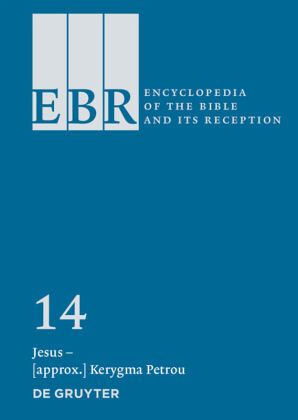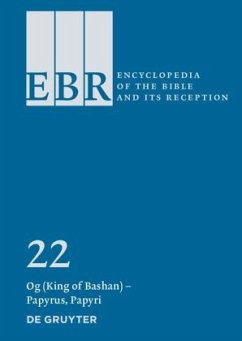Nicht lieferbar

Jesus - Kairos / Encyclopedia of the Bible and Its Reception (EBR) Volume 14
Versandkostenfrei!
Nicht lieferbar
The projected thirty-volume Encyclopedia of the Bible and Its Reception (EBR) is intended to serve as a comprehensive guide to the current state of knowledge on the background, origins, and development of the canonical texts of the Bible as they were accepted in Judaism and Christianity. Unprecedented in breadth and scope, this encyclopedia also documents the history of the Bible's interpretation and reception across the centuries, not only in Judaism and Christianity, but also in literature, visual art, music, film, and dance, as well as in Islam and other religious traditions and new religio...
The projected thirty-volume Encyclopedia of the Bible and Its Reception (EBR) is intended to serve as a comprehensive guide to the current state of knowledge on the background, origins, and development of the canonical texts of the Bible as they were accepted in Judaism and Christianity. Unprecedented in breadth and scope, this encyclopedia also documents the history of the Bible's interpretation and reception across the centuries, not only in Judaism and Christianity, but also in literature, visual art, music, film, and dance, as well as in Islam and other religious traditions and new religious movements.
The EBR is also available online.
Blogger's Choice - Articles recommended by biblioblogger Jim West (https://zwingliusredivivus.wordpress.com)
The entry in the 14th volume of the Encyclopedia of the Bible and its Reception which best represents the quality of scholarship and the range of reception of historical issues covered is the first article in the volume - on Jesus. The series of essays extends nearly 100 columns (50 pages) and could easily be a book in their own right. Dozens of authors have contributed and evaluated so many fascinating facets of the historical Jesus and his reception that one is left, after reading the entry, stunned and amazed. The authors of the eleven subsections include, but are not limited to Tom Homen, Rivka Ulmer, Donald Hagner, Justin Mihoc, Paul Metzger.
Jewish Revolt, First (Free content) (Mladen Popovic and Marijn Vandenberghe; Groningen, The Netherlands
Another of the very commendable entries of all those worthy of commendation is that by Popovic and Vandenberghe on the First Jewish Revolt. Whilst this is not a lengthy entry it nonetheless includes everything relevant to any modern discussion of the Revolt that saw the destruction of Jerusalem in the First Century CE.
https://www.degruyter.com/view/EBR/MainLemma_4080
John of the Cross (Terence O'Reilly; Cork, Ireland)
Scholars and students who appreciate mysticism and mystical theologians will enjoy O'Reilly's entry on St John of the Cross. His treatment of this important thinker (at least in the minds of those in some quarters of the Church) is precise and informative without being dull or plodding.
John the Baptist I. New Testament (Knut Backhaus; Munich, Germany)
Backhaus begins his survey of John the Baptist by suggesting that "Ever since Hermann Samuel Reimarus, research on John the Baptist has often been a "forerunner" of historical Jesus research and shared its methodological development. Within the "third quest" John is no longer viewed as a somewhat isolated predecessor, who prepares the way for Jesus, but as a prophet of eschatological restoration in the context of Second Temple Judaism." His piece then goes on to show why John deserves discussion and examination in his own right.
Josephus, Titus Flavius (Zuleika Rodgers; Dublin, Ireland/Tessa Rajak, Oxford, United Kingdom/Gerbern S. Oegema, Montreal, Que., Canada/ Bernhard Lang; Berlin, Germany/Ori Z. Soltes; Washington, D.C., USA)
Josephus receives a fair bit of attention, the entry discussing him covering twenty columns. He was and has been a polarizing figure and the authors of the subsections of his entry are able to overcome bias and present him - as he has been presented in Judaism, Christianity, literature, and the visual arts - with equity and charity.
Joyce, James (Free content) (Anthony Swindell; Llanidloes, United Kingdom)
James Joyce is introduced thusly and his presence in a volume devoted to Biblical Reception history is justified ful
The EBR is also available online.
Blogger's Choice - Articles recommended by biblioblogger Jim West (https://zwingliusredivivus.wordpress.com)
The entry in the 14th volume of the Encyclopedia of the Bible and its Reception which best represents the quality of scholarship and the range of reception of historical issues covered is the first article in the volume - on Jesus. The series of essays extends nearly 100 columns (50 pages) and could easily be a book in their own right. Dozens of authors have contributed and evaluated so many fascinating facets of the historical Jesus and his reception that one is left, after reading the entry, stunned and amazed. The authors of the eleven subsections include, but are not limited to Tom Homen, Rivka Ulmer, Donald Hagner, Justin Mihoc, Paul Metzger.
Jewish Revolt, First (Free content) (Mladen Popovic and Marijn Vandenberghe; Groningen, The Netherlands
Another of the very commendable entries of all those worthy of commendation is that by Popovic and Vandenberghe on the First Jewish Revolt. Whilst this is not a lengthy entry it nonetheless includes everything relevant to any modern discussion of the Revolt that saw the destruction of Jerusalem in the First Century CE.
https://www.degruyter.com/view/EBR/MainLemma_4080
John of the Cross (Terence O'Reilly; Cork, Ireland)
Scholars and students who appreciate mysticism and mystical theologians will enjoy O'Reilly's entry on St John of the Cross. His treatment of this important thinker (at least in the minds of those in some quarters of the Church) is precise and informative without being dull or plodding.
John the Baptist I. New Testament (Knut Backhaus; Munich, Germany)
Backhaus begins his survey of John the Baptist by suggesting that "Ever since Hermann Samuel Reimarus, research on John the Baptist has often been a "forerunner" of historical Jesus research and shared its methodological development. Within the "third quest" John is no longer viewed as a somewhat isolated predecessor, who prepares the way for Jesus, but as a prophet of eschatological restoration in the context of Second Temple Judaism." His piece then goes on to show why John deserves discussion and examination in his own right.
Josephus, Titus Flavius (Zuleika Rodgers; Dublin, Ireland/Tessa Rajak, Oxford, United Kingdom/Gerbern S. Oegema, Montreal, Que., Canada/ Bernhard Lang; Berlin, Germany/Ori Z. Soltes; Washington, D.C., USA)
Josephus receives a fair bit of attention, the entry discussing him covering twenty columns. He was and has been a polarizing figure and the authors of the subsections of his entry are able to overcome bias and present him - as he has been presented in Judaism, Christianity, literature, and the visual arts - with equity and charity.
Joyce, James (Free content) (Anthony Swindell; Llanidloes, United Kingdom)
James Joyce is introduced thusly and his presence in a volume devoted to Biblical Reception history is justified ful




